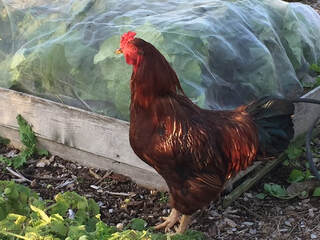 Josh - May 2020-December 2022.
Josh - May 2020-December 2022. Every homesteader will eventually face the inevitability of death - it is, after all, an essential part of the life cycle. We all know this, but for those who raise livestock, it is more visible (and visceral) than for others. And although we homesteaders expect death, knowing it will happen and actually experiencing it are two different things.
Growing up on a farm, I was familiar with death from a young age. A favorite cat died of distemper (very painfully from the looks of it) before I was ten. Chickens and goats died regularly (often at the hand of my father), and were usually enjoyed as dinner "from nose-to-tail," as the current slogan goes. I distinctly remember my grief when I accidentally stepped on a baby chick at about 9 years old, and also my determination as I twisted its tiny neck to try and put it out of its misery as quickly as possible, tears streaming down my freckled cheeks.
Two of my sisters - and several friends - have also kept chickens in adulthood, and I knew from their experience (as well as lots of reading) that apparently humans aren't the only creatures with a taste for chicken! So, when I got my first batch of my own chickens, I knew death would come. And I thought I was prepared.
The first death was mercifully quick. One of my pair of cute, curious young Buckeye hens (Henny) passed one day after acting sickly for less than 24 hours. (My informed theory was egg yolk peritonitis or EYT - also known colloquially as "yolk stroke," since she had laid a broken egg the day before.)
After finding her acting very sickly that morning, I put her into the "infirmary crate" before heading off to work with a sad farewell, fearing the worst. And she had, indeed, passed by the time I got home. I held her stiff, cooling, feathery body in my arms and shed a few tears before my husband helped me dig a hole at the base of the compost pile, and place her deep within. Just a few weeks shy of her first birthday, Henny was the first casualty of a series of seemingly reproductive-related illnesses that inflicted my hens over the next few years. (I still don't know the cause of their problems calcium absorption, although sometimes they simply refuse to eat their calcium supplements despite all my best efforts.)
We actually had quite a good span of decent health for our chickens for a while after that. Penny (Henny's sister) was the next to go, but it was nearly a year and a half later. Penny wasn't so lucky - she was sickly off and on for nearly 6 months before she finally went. She had stopped laying in the spring after a series of soft-shelled eggs, and although a course of antibiotics seemed to slow the illness, her swollen stomach remained, and she grew more sluggish over time, breathing heavily after even mild exertions. Eventually, the other chickens began picking on her, and I knew her time was coming, although I wasn't expecting it the day it happened.
When I let the chickens out in the morning, she tried to escape Josh's attentions by heading back into the coop, but couldn't make it all the way up the ramp. I picked her up and carried her around to put her in infirmary crate where she would be safe from molestation. However, no sooner had I put her in the crate then she flopped over, and I knew it was time.
I picked her back up and put her in the cool grass and stroked her soft feathers as she breathed her last. It was sad, but I knew she wouldn't suffer any longer, so I felt a calm sorrow as I carried her warm, feathery body over to find a spot for her in the new compost pile and tucked her in.
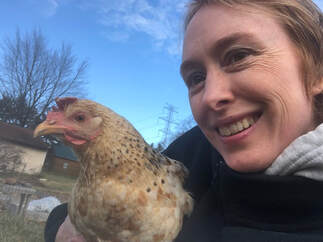 Eggo's last day.
Eggo's last day. Eggo was my little buddy. One of my eggers (who initially I didn't care much for), she had stopped laying after just one year, and had acted sickly off and on since then. We bonded a lot through her frequent stays in the infirmary crate and "private breakfasts" of oatmeal with antibiotics or other medications.
Although initially one of my more skittish hens, she eventually grew so tame she would follow me about like a puppy. Once, she actually ran and tried to leap into my arms when she saw me coming! She would often see me and run to me with her wings out like a little kid playing airplane. She was my sweet little baby, and as she grew thinner and weaker, even struggling to make it onto the roost, eventually I took her to a local vet who treats avian patients.
She seemed to enjoy the car ride in her hay-lined cat carrier, but they couldn't tell me what was wrong with her. They guessed perhaps cancer, and said she had a large mass in her stomach and that was why she was losing so much weight.
Her beautiful blonde feathers showed lovely black and gray speckles after her last molt that fall, and she had turned into such a pretty little hen!
But after a month or so of pain meds, I decided it was time. My farm-girl roots are still embarrassed by the fact that I couldn't put her out of her misery myself... Maybe if it had been another hen, but not her. The vet took care of her for me, and I buried her in the new compost pile on a chilly, misty December evening, racked with guilt.
Little did I know, the worst was yet to come, less than a week later...
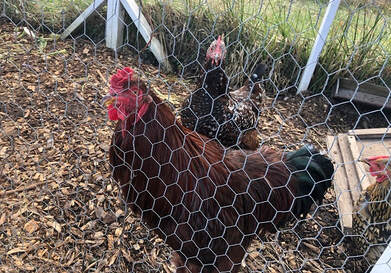 Josh's last selfie.
Josh's last selfie. "I let the chickens out as usual that December afternoon, and since I was working from home recovering from a head cold, I figured I'd let them out a bit earlier since it gets dark so early these days. It was around 3:30pm and was rather cold, so I let them out of the run, gave them some scratch grains, and didn't linger. They all came running out, and Josh was scratching and clucking and doing his usual song and dance as I walked away...
Just around 5:00pm, I went out to the garden to cover my winter crops, as cold weather was returning that night. It was before dusk, but getting close, so I didn't notice anything amiss when I didn't see the chickens out and about. But then I went to close up the coop, all ready to say goodnight as usual... and it was empty!
I looked around but didn't notice any piles of feathers anywhere, so I figured maybe something had spooked them and they were just hiding out somewhere since it wasn't that dark yet. I checked to make sure there was nothing in the coop, then came back out of the run, calling for them, and little molting Chup-Chup came hesitantly from behind the coop out of the tall grass. I looked over in the direction she had come from, and saw Helga sitting on the ground by the corner of the chicken fence.
This was when I first had a sinking feeling in my stomach... I quickly went over to her, wondering if she was injured, but she stood up, and I picked her up and looked her over as I carried her to the coop. She seemed fine, and I put her inside. Chup-Chup followed me, and as I turned around, I saw Chickie-Chickie come running over from the direction of the big brush pile. They both went into the coop, and I headed over to the brush pile to look for the others.
I started pulling at some pine branches that were piled on top, and immediately heard a worried clucking sound from somewhere, which I recognized as Leggo's voice. I worked my way around towards the clucking sound until I could see her blond feathers through the branches. When I got to her, she was wedged in so tightly that I had to break a branch to get her out. She sprang free, and I managed to grab her though she put up her usual fuss. I soothed her as I carried her to the coop, and then headed back to the house to get a flashlight as it was getting too dark to see.
All the hens seemed uninjured although traumatized, and I still had a small glimmer of hope, but it was fading fast, as I knew Josh would never remain hidden and silent if he could hear any of his hens in distress. I told my husband Josh was missing, grabbed my headlamp, and ran back out.
I worked my way around the brush pile, shining the light through the branches, and once I reached the back, I finally saw Josh's glossy red feathers under the pile. I knew right away by his stillness that he was gone. I reached in and took hold of his body to pull him out, and felt his heavy weight, already stiffening although still warm under his thick feathers. He seemed to be stuck, so I gave a little tug, and as he came free, an unmistakable head with a sharp, curved beak popped up into the beam of my headlight...
The hawk had been holding his leg, trying to pull him under the pile of brush. It let go and ducked back into the pile, and I carried Josh's body over by the chicken run and laid him in the grass, where I could not hold back the tears. I turned him over and examined him, but other than the mostly bare leg where the hawk had been holding him, along with a few bruises and scratches, I couldn't find much damage. He had a bit of blood on his wattles and neck, so perhaps it had grabbed there and broken his neck?
My husband arrived with a flashlight and I showed him where I had found Josh. We heard a rush of wings, and looked up as the hawk flew into the trees near the run and sat, turning its head back and forth in the deepening dark. It was BIG. Not as big as Josh, but the biggest I have seen around here in a long time.
I closed the coop up, as the hens sat, shell-shocked on the roost in a huddle. I was crying unstoppably the whole time as we carried Josh over by the compost bins and I went to get a shovel to bury him. I had to pull his body out three times and dig the hole bigger as he was so big I couldn't get him to fit...
Before I laid him to rest at last, I held him and stroked his gorgeous glossy feathers and his beautiful rose comb (now purple in death) and smelled his warm chicken smell, and thought how I would never hear his awesome crow again... He was so beautiful and brave and had so much personality!
I know he died living his purpose - defending his hens - but it has been much more devastating than I ever expected. I can't seem to stop thinking about it - living those moments over and over again... Thinking about the what-ifs...
What if I had let them out half an hour later? Would the hawk have gone on its way by then? Or would it have been visible nearby, so that Josh might have noticed it and warned us, and I might have chased it away - or left them in the run that day for safety?
What if I had heard the ruckus when it attacked? Could I have run out and saved him before he was mortally injured?
The next day, in the daylight, I looked for clues and followed the copious trail of feathers under several bushes and ultimately into the brush pile. He obviously put up quite a fight, and the hawk kept attacking and chasing until it finally won.
It still hadn't given up then, either. It was sitting on the brush pile the next morning, and I chased it with a stick until it flew away into the trees bordering our property. Later in the afternoon, it was back there again - looking for its prey. I grabbed Molly Brown's leash and brought her out to chase it away, and it finally left and I have not seen it since.
But the hens have not recovered. They refused to come out of the coop at all for the next two days. Even now, most of them will only leave the coop for a few minutes at a time, and Helga (who was always Josh's favorite) barely at all. Losing each of the 3 hens we've lost so far has been hard, but nothing like this. Losing a hen is always sad for me, but life goes on just the same afterward. The other chickens barely seem to notice. This is different. Life has gone on, but it will never be the same. The flock seems lost, sad, devastated without their leader.
Waking in the morning, there is so much silence. No jubilant crowing. Letting the chickens out of the coop in the morning is sad rather than a joyous occasion filled with dancing, clucking, and scratching. Saying goodnight, the coop seems so empty without his large, warm, feathery presence.
I suppose I will get over it - eventually. Forgetting his silly, bouncy run. His high-pitched "cluck-cluck-cluck!" as he scratched and tried to share some imagined morsel of tastiness with me and the other hens (he always thought I was one of them). His quiet, calming "cluck-cluck-cluck-cloo" in the coop in the morning, and how he would peck the window screen to be let out as I filled the waterer. His big, bright orange eyes looking at me quietly as I stroked under his warm wattles saying goodnight on the roost...
I suppose I will forget eventually. But for now, I am too busy mourning the loss of his amazing, energetic, generous, and vibrant presence. And nothing seems the same."
He wasn't the last hawk casualty, either. Due to a misunderstanding with the neighbor who was watching our flock over the Christmas holiday, we returned to find the hens had been allowed out of the run (where they had been confined ever since Josh's death), and Chup-Chup was the next casualty.
Whether it was because it was so close on the heels of Josh's murder, because I had Covid and wasn't feeling that well, or simply because I didn't care much for her, I didn't shed too many tears over her. She was a great layer and very beautiful, but also quite mean, and bullied the other hens mercilessly. I missed her only due to the reduction of my lovely flock down to just 3 hens.
Overall, it was a winter of loss and sadness, and I was ready for it to be over!
I spread Penny's compost pile on the garden (no sign of her other than some extra-rich and dark soil in one spot), and she joins the microbes to feed my growing plants. The cycle of life moves on.
We built a mobile hawk shelter for the hens out of cattle panels and chicken wire, and they spend several hours per day enjoying the grass and bugs - each day in a different spot. In the later evenings when I am working in the garden nearby to watch them, they roam their paddock freely for an hour or so, chasing bugs and being chickens. My sweet Helga has assumed the flock leader position, and sometimes clucks in a very Josh-like way when she finds an exciting bit of food to share!
But in the back of my mind, I know more loss is ahead. Molly Brown is becoming feeble, and has started losing her hair, coughing a lot, and generally seeming old and slow. 14 years is a good life for a Lab. We have loved her so much! I know the house will feel so empty when she's gone... And I'm sure, eventually, another furry friend will cheer our hearts in her absence.
Love. Death. Our constant companions in life. And ever-present on the homestead.
Rose.

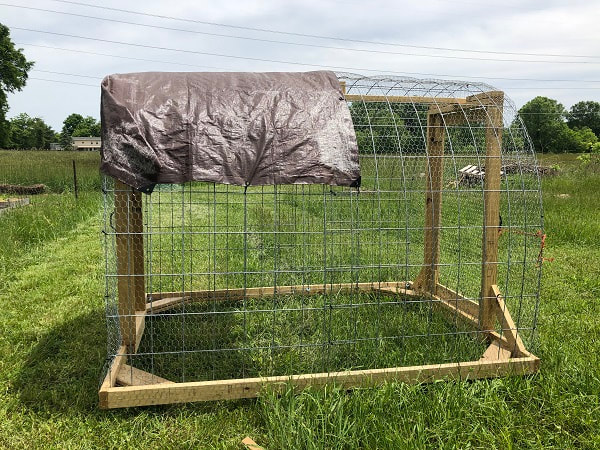
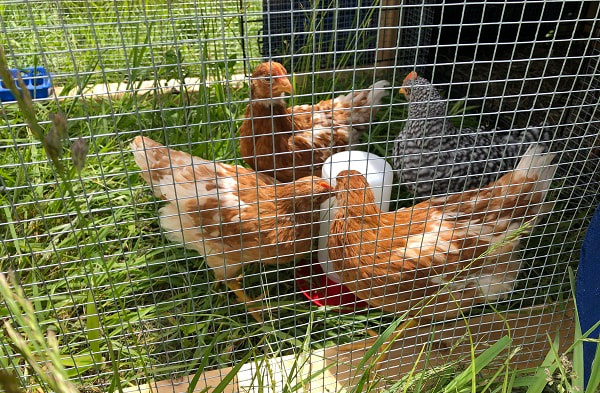


 RSS Feed
RSS Feed